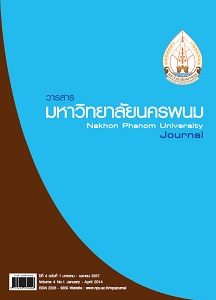บทบาทของผู้บริหารสถานศึกษาในการส่งเสริมการปฏิบัติตามจรรยาบรรณวิชาชีพของ ข้าราชการครูในโรงเรียน สังกัดสำนักงานเขตพื้นที่การศึกษาประถมศึกษาบึงกาฬ
Main Article Content
Abstract
การวิจัยครั้งนี้มีวัตถุประสงค์เพื่อ 1) ศึกษาบทบาทของผู้บริหารสถานศึกษาในการส่งเสริมการปฏิบัติตามจรรยาบรรณวิชาชีพ ของข้าราชการครูในโรงเรียน สังกัดสำนักงานเขตพื้นที่การศึกษาประถมศึกษาบึงกาฬ และ 2) เปรียบเทียบความคิดเห็นของข้าราชการ ครูต่อบทบาทของผู้บริหารสถานศึกษาในการส่งเสริมการปฏิบัติตามจรรยาบรรณวิชาชีพของข้าราชการครู จำแนกตามสถานภาพ และขนาดของโรงเรียน กลุ่มตัวอย่างการวิจัยมีจำนวน 331 คน ประกอบด้วยผู้บริหาร จำนวน 29 คน และครูผู้สอน จำนวน 302 คน โดยวิธีการสุ่มแบบแบ่งชั้น (Stratified Random Sampling) เครื่องมือที่ใช้ในการเก็บรวบรวมข้อมูล ได้แก่ แบบสอบถามมาตราส่วน ประมาณค่า 5 ระดับ มีค่าอำนาจจำแนกระหว่าง 0.43-0.83 ค่าความเชื่อมั่นทั้งฉบับเท่ากับ .98 สถิติที่ใช้ ได้แก่ ร้อยละ ค่าเฉลี่ย และ ส่วนเบี่ยงเบนมาตรฐาน สถิติที่ใช้ทดสอบสมมติฐาน คือ t-test (Independent Samples) และการวิเคราะห์ความแปรปรวนทางเดียว (One–way ANOVA) ในกรณีที่พบความแตกต่างของค่าเฉลี่ยทำการวิเคราะห์เป็นรายคู่ โดยวิธีการของเชฟเฟ่ (Scheffe’) ผลการวิจัย พบว่า ผู้บริหารมีบทบาทในการส่งเสริมการปฏิบัติตามจรรยาบรรณวิชาชีพของข้าราชการครู โดยรวมอยู่ในระดับมาก เปรียบเทียบ ความคิดเห็นของข้าราชการครูต่อบทบาทของผู้บริหารสถานศึกษา จำแนกตามสถานภาพ โดยรวมไม่พบความแตกต่าง เมื่อพิจารณา รายด้าน พบว่า มีความแตกต่างกันอย่างมีนัยสำคัญทางสถิติที่ระดับ .05 จำนวน 2 ด้าน ได้แก่ ด้านจรรยาบรรณต่อวิชาชีพ และด้าน จรรยาบรรณต่อผู้รับบริการ เปรียบเทียบความคิดเห็นของข้าราชการครูมีต่อบทบาทของผู้บริหารสถานศึกษาในการส่งเสริมการปฏิบัติ ตามจรรยาบรรณวิชาชีพของข้าราชการครู จำแนกตามขนาดของโรงเรียน โดยรวม พบว่า มีความแตกต่างกันอย่างมีนัยสำคัญทางสถิติที่ ระดับ .01 เมื่อพิจารณารายด้าน พบว่า มีความแตกต่างกันอย่างมีนัยสำคัญทางสถิติที่ระดับ .05 จำนวน 3 ด้าน ได้แก่ ด้านจรรยาบรรณ ต่อตนเอง ด้านจรรยาบรรณต่อวิชาชีพ และด้านจรรยาบรรณต่อผู้รับบริการ
The purposes of this study were 1) to examine school administrators’ role in promoting practice in compliance with the professional ethics among teacher-officials at schools under the Office of Buengkan Primary Education Service Area, and 2) to compare teacher-officials’ opinion on the role of school administrators in promoting practice in compliance with the professional ethics among teacher-officials as classified according to status and school size. The sample selected by stratified random sampling consisted of 29 administrators and 302 teachers totaling 331 people. The instrument used for data collection was a 5-rating scale questionnaire, having discrimination power values between 0.43 and 0.83 and an entire reliability coefficient of 0.98. Statistics used were percentage, mean, standard deviation, t-test (independent samples) for hypothesis testing and one-way ANOVA. In case the difference between the means was found, the Scheffe’s method was applied for pairwise comparison. The findings disclosed as follows : the overall opinion on administrators’ role in promoting practice in compliance with the professional ethics among teacher-officials was at the high level. The comparison of the teacher-officials’ overall opinion on the role of school administrators as classified by status was found not different. Considering it by aspect, there were found significant differences at the .05 level in 2 aspects : professional ethics and service ethics. The comparison of the teacher-officials’ overall opinion on the role of school administrators as classified by school size was found significantly different at the .01 level. Considering it by aspect, there were found significant differences at the .05 level in 3 aspects : self-ethics, professional ethics and service ethics.


